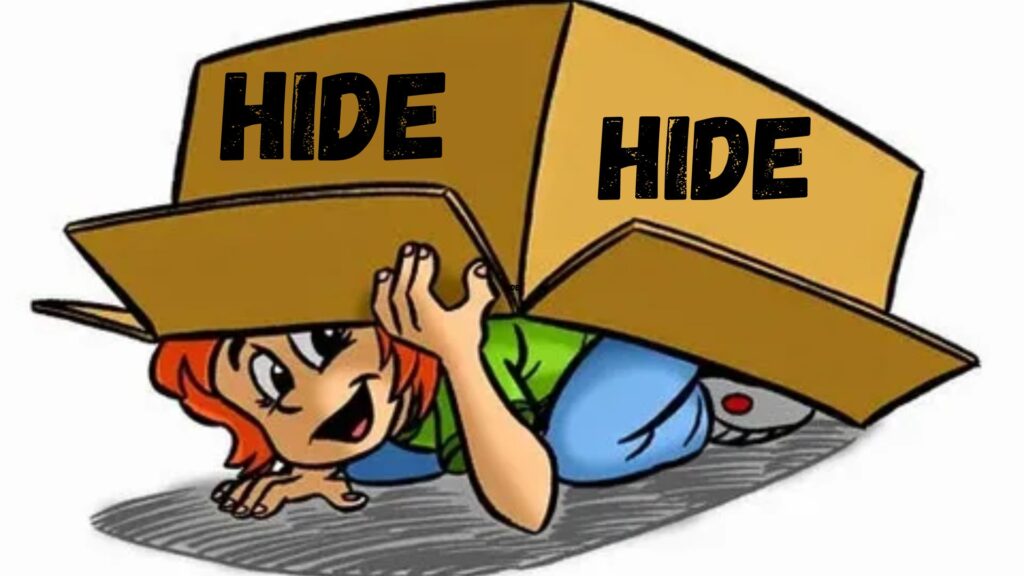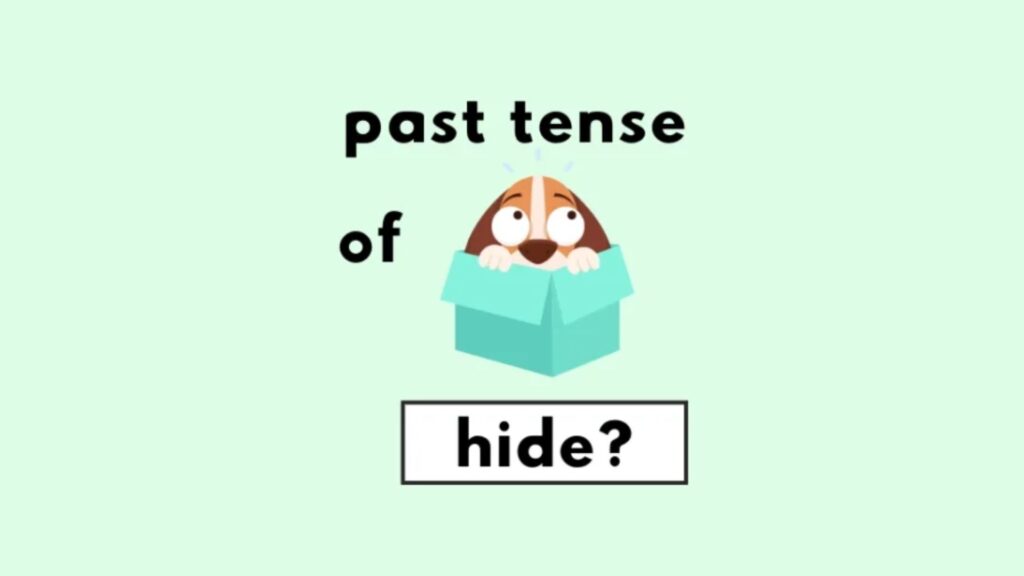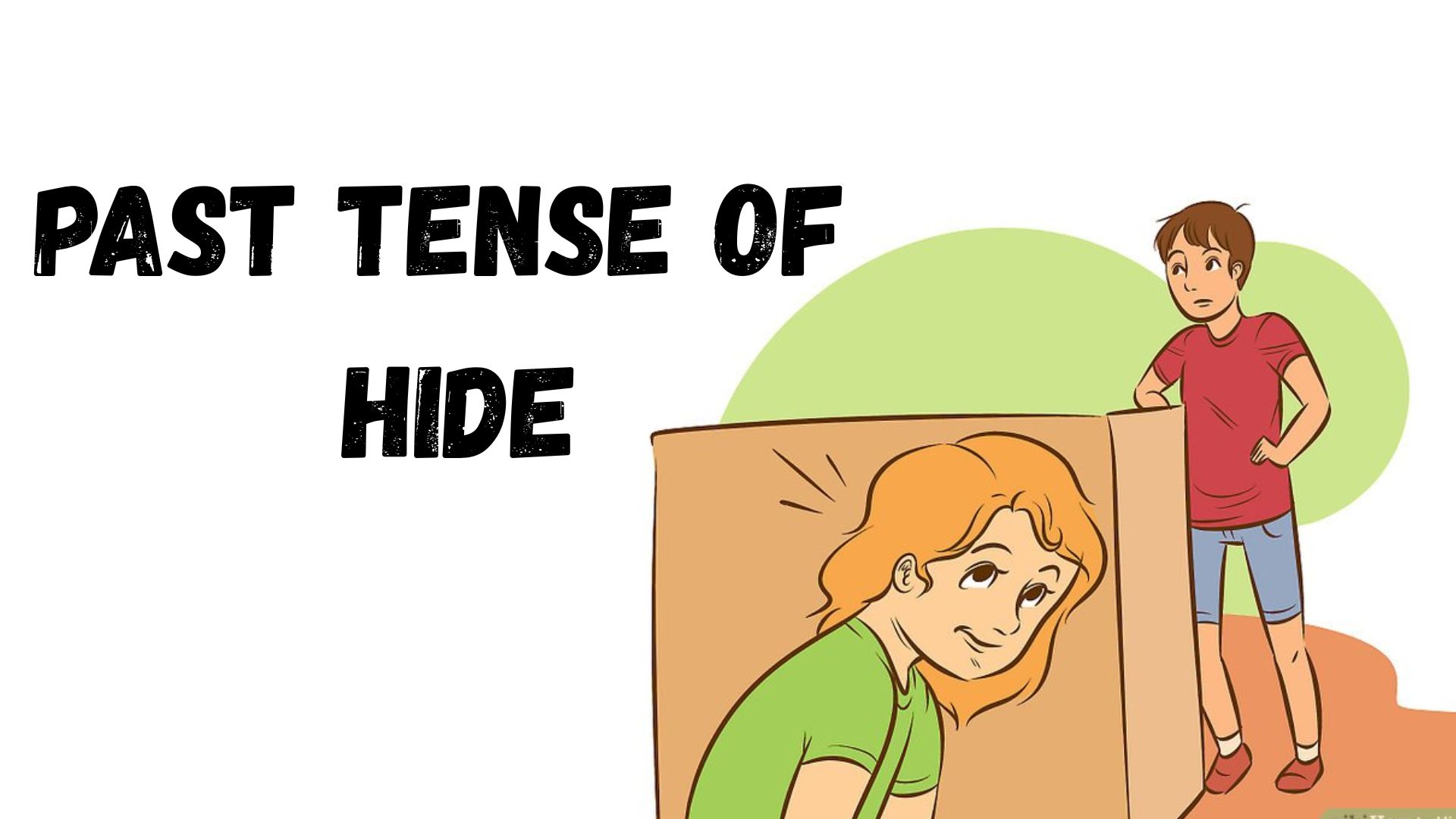Ever found yourself wondering, “Wait… is it hid or hidden?” You’re not alone. The verb hide trips up a lot of people, especially when switching between tenses. That’s because hide is an irregular verb it doesn’t just tack on “-ed” to shift from present to past.
Let’s break it down, in plain, human language, with real-life examples to make everything click.
Understanding the Verb Hide

To hide means to conceal, cover, or keep something out of sight whether it’s a secret stash of cookies or a childhood diary.
This verb has three key forms:
- Present tense: hide
- Simple past: hid
- Past participle: hidden
So no, hidden isn’t just a fancy synonym of hid. It has its own grammatical job to do.
✅ What’s the Simple Past of Hide?
The simple past tense of hide is hid.
This form is used when the action happened in the past and is now finished.
📧 Email Example
Subject: Found the Files!Hey Chris,
You won’t believe it I hid those backup files inside the “misc” folder weeks ago. Just found them again by accident!
– Alex
In that sentence, the hiding happened in the past. It’s over. No need for a helper verb.
✅ What’s the Past Participle of Hide?

Here’s where things often get fuzzy.
The past participle form of hide is hidden, and it’s used with auxiliary verbs like have, has, or had. This form appears in perfect tenses or passive voice constructions.
📧 Scenario: An Office Confession
Subject: Re: That Missing ReportHey Vanessa,
I just realized I had hidden the quarterly report under a stack of old notebooks. I’m emailing it over now. Sorry for the delay!
– Jordan
Here, “had hidden” is part of the past perfect tense, which describes an action that was completed before another past event.
⚠️ Common Mistakes to Avoid
Let’s get this one out of the way:
✗ I have hid the treasure.
✔ I have hidden the treasure.
Why is that second one right?
Because when you use have, you need the past participle and that’s hidden, not hid.
Here’s a quick verb conjugation chart for reference:
| Tense | Form | Example |
|---|---|---|
| Present | hide | I hide my phone during meetings. |
| Simple Past | hid | She hid the present under the bed. |
| Past Participle | hidden | They have hidden the keys again. |
| Present Perfect | has/have hidden | He has hidden it too well. |
| Past Perfect | had hidden | We had hidden everything before they arrived. |
| Passive Voice | was/were hidden | The files were hidden from view. |
🧠 Why Hide–Hid–Hidden Is Irregular
The verb hide follows an ablaut pattern, an ancient feature of Germanic languages where vowels change to indicate tense. You see it in other irregular verb examples like:
- Sing → sang → sung
- Begin → began → begun
- Drive → drove → driven
This vowel shift system is called Germanic ablaut, and it’s why you don’t say “hided.” English picked this up from its Old English roots. In Old English, the word was hydan, and its past forms behaved similarly.
When to Use Hid vs. Hidden

Here’s a little grammar tip:
Use hid when you’re just talking about what happened.
Use hidden when you’re linking that past action to another time, using have, has, or had.
✉️ Email Scenario – From a Camp Counselor
Hey parents,
We played a fun game of hide-and-seek today, and your kids really went for it. One of them even hid in a tree for 15 minutes!
– Amanda
✉️ Follow-up Email
Update: Turns out they had hidden a walkie-talkie in the snack box! Clever bunch.
✨ Idioms and Phrases with Hide
The verb hide has worked its way into all sorts of English idioms and figures of speech. These add richness to writing and can subtly trip you up when dealing with tenses.
Here are some examples using both hid and hidden:
- Hide in plain sight He had hidden the clue right in front of everyone it was genius.
- You can run, but you can’t hide You hid, but eventually you had to face the consequences.
- Haven’t seen hide nor hair I haven’t seen hide nor hair of him since last Friday.
- Hide your light under a bushel Don’t hide your talents show them off!
- Hide one’s head in the sand She just hid her head in the sand when things got tough.
🧩 The Role of Hidden in Passive Voice
Here’s where hidden shines.
The passive voice focuses on what’s being done to something rather than who’s doing it. In these cases, hidden acts as a past participle in the verb phrase.
The documents were hidden in a locked drawer.
You’ll never hear:
✗ The documents were hid in a drawer.
That’s a tense fail.
👩🏫 Bonus: Teaching Tip for Learners
When helping someone master verb inflection and tense formation, point out these patterns:
- Simple Past = No helper verb: I hid it.
- Past Participle = Needs helper verb: I had hidden it.
A past tense grammar exercise idea:
Fill in the blanks:
- Before the guests arrived, we ___ all the toys. (hid)
- They’ve ___ the instructions somewhere safe. (hidden)
- The treasure was ___ beneath the old oak tree. (hidden)
Answers: 1) hid 2) hidden 3) hidden
Quick Recap Table
| Use Case | Correct Form |
|---|---|
| Simple past event | hid |
| Present perfect | has/have hidden |
| Past perfect | had hidden |
| Passive voice | was/were hidden |
| Common error (✗) | “have hid” |
Final Thoughts: Use the Right Form at the Right Time
The difference between hid and hidden comes down to grammar, not style. Both are correct but they belong in different places.
- Use hid for simple past
- Use hidden for perfect tenses or passive voice
Next time you’re writing an email, drafting a blog, or telling a story, pause and ask yourself: “Do I need a helper verb like have or had?” If yes, go with hidden. If not, hid is your pick.

